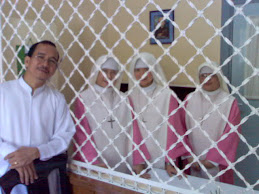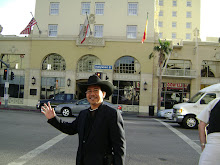Every 2nd Sunday of Advent, whether it be Year A, B, or like this year which is Year C, we are always introduced the person of John the Baptist, Jesus' cousin, Mary's cousin Elizabeth's son. I'd like to share here my thoughts for my homilies which I delivered in the Eucharistic celebrations for today.
We are given this person John the Baptist in the context of his times. He was supposed to be a memorable personality because he was one of those whom Herod beheaded. These data only prove to us that the Lord we believe in and wait for at the time of Advent, and beyond of course, is a real person. At least John the Baptist knew Him, and testified to Him. As many homilists and commentaries for today have pointed out, the Lord Jesus is not a fiction of the mind. God became flesh in Him, and we have seen Him, as the Gospel of St. John the Evangelist has further written. The reality of the Lord thus becomes evident when we are shown John the Baptist.
I often received text messages in my cell phone from people who are not in my list. I used to simply ignored them. Even in my email, there appear now and then, names of senders whom I don't have memories of. I used to spam them. For me, nameless and faceless senders are common in this hi-tech world we live in, and the feeling of being in the dark often catches me anxious. My way of coping would be the silence of ignoring. But there was this particular sender whose email must have been simply so clean the spamming feature of my email provider failed to shut him out of my inbox. Hence I decided to write him, asking him to refresh my memory of him. I further encouraged him with this thought: even God showed Himself; He gave us a face we could recognize in the light: Jesus. You might want to imitate Him and come out into the open rather than stay in the darkness of anonymity. He replied, telling me that we met at a wedding in Makati. As he narrated the occasion, the memory of that night at a reception of a wedding I had just solemnized came back like a film. We were all sgtrangers in that table, but since the wedding was a happy occasion, we broke the ice. What struck me further was his mention of the walk I had after the meal while looking at the enlarged wedding pictures of the bride and groom. It was there where we talked and got to really know each other. It was there that I gave him my email address. He even sent me a picture of him, and the memory became alive again. I had to reply back with joy and gratitude as a happy moment of my life was rekindled. I had to admit to him that honestly my having forgotten him and that wedding night may have made me think negatively of him. Indeed, like the emails and text messages I receive, John the Baptist brings back to us the reality of the Lord we have met in our lives: at baptism no matter how young we were; at the Eucharistic table no matter how awake or drowsy we may have been; at the religion classes we attended in class and in Church no matter how forced we may have felt at attending. John the Baptist thus serves as a memory retrieval device, if I may use the term.
As I searched for more thoughts in the internet, I read Fr. Cantalamessa's commentary for today's readings. He said: "The traditional prophets helped their contemporaries look beyond the wall of time and see into the future, but John helps the people to look past the wall of contrary appearances to make them see the Messiah hidden behind the semblance of a man like others. The Baptist in this way inaugurated the new Christian form of prophecy, which does not consist in proclaiming a future salvation ("in the last times"), but to reveal the hidden presence of Christ in the world." My understanding of his thought goes this way: the prophets of the Old Testament foretold of something yet to come. But John the Baptist as prophet told us about the Christ, long foretold, and is already in our midst. This thought thus further heightens the mystery of Advent: we await for One Who is actually in our midst already. Advent thus becomes a moment of opening ourselves to the presence of Christ "coming" to us. The future "is already but (the) not yet," a phrase we were taught in Eschatology. It is here that the significance of Advent for this year gets its inspiration.
We have recently been battered in the Philippines by four super typhoons. Reming was the worst because it had left so many dead and yet more homeless and nearly hopeless. Here in Manila, classes were suspended for us to prepare to avert what we experienced when Milenyo ravished the place last September 28. Even though Reming skipped Metro Manila, I felt the desire to see for myself how this Reming would fare. I saw for myself the cruel winds and rains of Milenyo the killer typhoon. Hence, I waited for the television footage in the late night news. There I first saw a woman saying before the reporter: "Wala na kaming Pasko." (We have no more Christmas [this time].) I felt a certain pinch in my heart which stirred me to ask you to please remember them this Christmas. The least we can do is pray for them, here in our Mass, in our personal and family rosaries, and even when we adore the Blessed Sacrament in the Adoration Chapel. If ever we decide to buy something new for ourselves and our loved ones, do let go of the old and share them with these people. The Churches and other non-government and charitable organizations are busy collecting whatever we can share with them. The governors of the battered provinces, as well as the people have said that they don't need money, for money can't feed them as there is virtually nothing to buy. Everyone seemed to have been affected. Food, so basic and yet so scarce is what they need so badly. Ricefields and vegetable gardens where they could get some subsistence were all ravaged cruelly. Roofs were simply blown away. The floods have carried many houses, including the weak, burying them under mud and sand. If we shall be celebrating the birth of Christ this Christmas, and thereby remember that we have shared even the least to these people of Albay, Sorsogon, Catanduanes, Mindoro, Marinduque, and many other areas, then we shall have really celebrated the joy of His birth in our midst. Our sharing with them would have then become our clear message to Christ: "Look, Lord, we are ready for more of the life You want to give us with Your coming."
Sunday, December 10, 2006
Subscribe to:
Post Comments (Atom)


1 comment:
I like reading your sermons... it gives me a sense of meaning of the celebrations in the church...Please continue to share... You are God's instrument of bringing Christ to us... Thank you..Danny from Guam, USA
Post a Comment